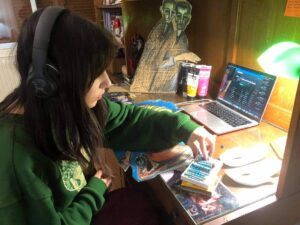Are we forgetting the young, in the frenzied emphasis on protecting the old during the virus? Or was it all going downhill anyway?
It’s not the kind of thing you expect to hear from a fresh-faced 24-year-old, but there it is: “Most of my friends,” claims Natalie Godjamanian, “suffer from mental-health issues”.
“It’s a generation of anxious people,” she goes on. “There’s not a lot to be comforted by, at the moment… So a lot of them are suffering from anxiety, or depression, a lot of them are being medicated for things like ADHD, or [taking] anti-depressants, things like that.” She sighs, with an air of stating the obvious: “And this doesn’t really help”.
‘This’, of course, is the pandemic, the situation created in the past year – and likely to reverberate for many years to come – which has affected all ages, but with a unique impact on the young.
On the one hand, they have least to fear from coronavirus, with only a tiny risk of dying from the disease (though the dangers of ‘long Covid’ are still being worked out). On the other, the measures and lockdowns of the past year have wiped out many of the part-time jobs – especially in the service sector – that sustain young people as they try to settle on a stable career, seriously weakened their (already weak) long-term prospects, and derailed their lives more generally.
The ages from approximately late teens to mid-20s are a momentous time of life, a time of leaving home, usually going off to study, taking a first tentative dip in the job market – but also of spreading one’s wings, discovering oneself as a person. This year, however, even the first of those milestones (leaving home) has been upended.
“I haven’t been to university at all this year,” says 18-year-old Danae Finiri, a first-year Psychology student at the University of Manchester. Instead she’s home in Cyprus, uploading pre-recorded lectures with embedded Zoom links. The links lead to Q&A sessions where students can at least get a glimpse of their professors – though not each other, since cameras stay switched off. That’s almost the extent of her student life, though she and a few other girls also have a Snapchat group for course-related chat.
Granted, we have bigger problems at the moment than first-years being unable to socialise. Still, a couple of questions come to mind. Firstly, why are universities (at least in the UK) charging their usual fees for what’s clearly a much-reduced experience? Manchester at least has “support bubbles” for students who are lonely or isolated, raising the spectre of mental health again – but that leads to the second question, namely do students really have to be so isolated? Surely allowing them some freedom to mingle among themselves – meanwhile trusting them to keep a distance from vulnerable groups – might do more for their mental health than cowering at home, waiting for the threat to blow over.
Twenty-two-year-old Maria Ieridou disagrees, pointing out that many youngsters are themselves among the vulnerable groups; “I think young people are very much affected by this”. The debate might seem irrelevant anyway – but in fact the official line at universities is a good reflection of how Generation Z tend to get treated by society in general. On the one hand, they’re over-protected, and always have been; this is the generation of helicopter parents and safe spaces. On the other, they’re left with curtailed freedom and limited options. And always, at the end of the day, they’re financially exploited.
“Even before the pandemic,” says Godjamanian, now in her final year of an integrated Master’s in Fine Art and History of Art, “we knew that we’re going to be the generation that can’t afford to buy a house, that we’re going to be renting or living with flatmates all our lives. We’re going to have more than one job, because one job that pays minimum wage doesn’t let you live at all!… So we’re all sitting there saying, ‘Everything’s going to get better’ – but we understand that we’re living in a political-economic system that doesn’t care for us, and doesn’t give us anything. And we’re going to struggle through it most of our lives.”

Natalie Godjamanian Is Doing Her Final Year Of A Fine Arts And History Of Art Master’s Degree From Home
Even before all this madness, jobs for young people in most of the world (including Cyprus, battered by the haircut and economic crisis) were thin on the ground. “I’m looking for a paid job,” says 24-year-old recent graduate Giorgos Lykourgos, now working unpaid as an intern, “but it’s hard for someone with only one degree.” He plans on embarking on a Master’s when the situation improves – but not all his peers are academically-minded and besides this is a fluid, impulsive age, when many youngsters want to see the world while working what he calls “intermediate jobs”.
Most of his friends work in bars, says Lykourgos. Some are actually quite happy doing that, and would do it long-term if it were financially viable. Even pre-pandemic, however, “you might get €3 an hour” as a barista; “I know people who were planning to start a family on under €4 an hour”. Many 20-somethings were “kind of on the margins”, even a year ago.
The pandemic has hugely exacerbated this situation, not just decimating such jobs but compressing the job market in general. Godjamanian has friends who’ve applied for the kind of entry-level jobs usually reserved for recent graduates with no experience – only to find they’ve now been supplanted by experienced but newly-jobless applicants who are willing to work for entry-level pay, just because things are desperate. “Everything’s been bumped down,” she explains. “So, if there’s no jobs for them, what hope do we have?”
Admittedly, things may not be so desperate. The big change in the past year has been a wholesale shift from office to online, opening up a slew of opportunities in digital jobs, not to mention the possibility of living in one country and working in another. New small businesses will also presumably appear to take the place of (some of) those that went under, once the virus has been brought under control.
Indeed, it may be unhelpful even to talk about such things in the midst of a pandemic. “I don’t think that far ahead,” says Ieridou, who’s completing an Art and English Literature course at the University of Reading. “When you consider that people you know – and people around you – are getting sick, I don’t think you worry about that. I’m personally not worried about finding jobs in the future. I just want to get through right now, hopefully.”
That, of course, brings us back to mental health again – a recurring theme, despite young people’s relative immunity from Covid. “The emotional toll this takes is exhausting,” says Ieridou. “To be worried all the time.”
If anything, the impact on the young may be even more insidious – the constant fear of accidentally passing on the virus to a vulnerable person, without even realising that one is infected – and lockdown also hits them especially hard. This is a sociable age, and spontaneous too; middle age often forgets youth’s propensity for doing something random (“Going to the park at 10pm to sit for a while,” says Lykourgos by way of example), just to feel like it can. Physical activity and interaction – hugging friends, being in a crowd – are a huge part of wellbeing. The desire to travel and see the world is at its strongest.
First World problems, some will scoff – yet there may be something uniquely disillusioned about this particular generation. “For people raised in the 90s and 2000s, it was kind of a golden-age window of prosperity,” muses Godjamanian. “So our parents were in a good mood, they were raising us in a good mood, there was a lot of possibility in the air. They raised us thinking that’s what we were going to have. And now we’re being faced with the reality of it, which is a lot uglier than we thought it was going to be.”
These are the kids who saw prosperity fall off a cliff in the late 00s and early 10s, never to return. These are the kids – actually the first generation of kids – who’ve had social media since they hit puberty, the constant bombardment of links and videos adding to their over-anxiety. And now the pandemic, with its measures and restrictions, and drip-drip of tragic news and conspiracy theories. Is it any wonder that mental health is taking a beating? At her university, says Godjamanian (she’s at Edinburgh, though of course online at the moment), there were two counsellors offering therapy sessions – and around 2,000 students applying for a slot! Cyprus is better, though it’s more a matter of people here preferring to admit to stress rather than depression.
What’s the bottom line? Are we forgetting the young, in the frenzied emphasis on protecting the old? Is Covid a kind of grim punchline, a generation that’s been let down again and again finally pushed into penury – to protect against a virus that was never a major threat to them in the first place?
If so, you have to say they’re taking it well. All in all, despite the antics of a raucous minority, this generation of ‘anxious people’ have been remarkably compliant and responsible throughout the Covid crisis – and seem quite philosophical when asked about the future. What are they likely to be faced with, once the pandemic is over?
“We’ll find what we had before,” shrugs Lykourgos. “Only with less money.”









Click here to change your cookie preferences